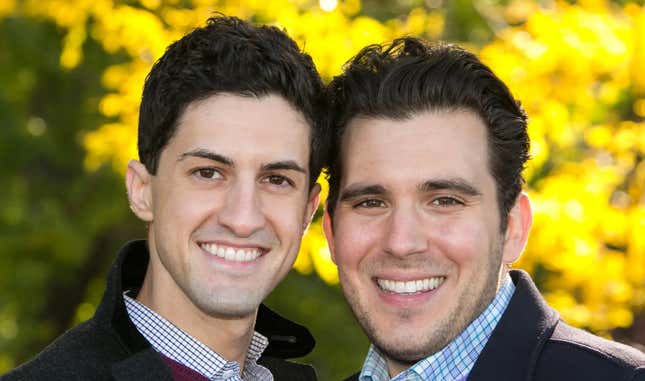Gay Couple Sues for IVF Coverage Amid Escalating Homophobic Attacks
Two New York City lawyers wanted to start a family in 2017. But they didn't meet a heteronormative definition of infertility to qualify for IVF coverage.
JusticePolitics

Shortly after getting married in 2016, New York City lawyers Corey Briskin and Nicholas Maggipinto began their journey to start a family, hoping to have children using in vitro fertilization. But when the couple sought coverage of IVF through Briskin’s health plan as an employee of New York City, they learned they didn’t qualify for the plan’s IVF benefits because they didn’t meet its definition of “infertile”—which was shaped by cis-heteronormative conceptions of intercourse. This essentially pushed IVF out of reach for the couple, as the process is jarringly expensive out-of-pocket.
Per the terms of Briskin’s health coverage, someone is infertile if they can’t conceive after 12 months of unprotected heterosexual sex, or for cis, gay women without male partners, multiple unsuccessful attempts at intrauterine insemination. These terms specifically exclude cis gay men from IVF benefits.
This week, Briskin and Maggipinto filed a class-action complaint with the U.S. Equal Employment Opportunity Commission, alleging that this exclusion of same-sex male couples by the city’s health plan violates state and federal civil rights. In their complaint, the couple cites the 2020 case Bostock v. Clayton County, in which the Supreme Court ruled that Title VII protects workers from being discriminated against based on their sexual orientation.
“This case represents gay men trying to explain to their employer what equality means, that it includes having equal access to the same benefits as other employees,” Peter Romer-Friedman, Briskin and Maggipinto’s lawyer and head of Gupta Wessler PLLC’s civil rights practice, told Jezebel. “It’s an outgrowth of Bostock v. Clayton.”
-

-

-

-

-

-

-

-

-

-

-

-

-

-

-

-

-

-

-

-

-

-

-

-

-

-

-

-

-

-

-

-

-

-

-

-

-

-

-

-








































